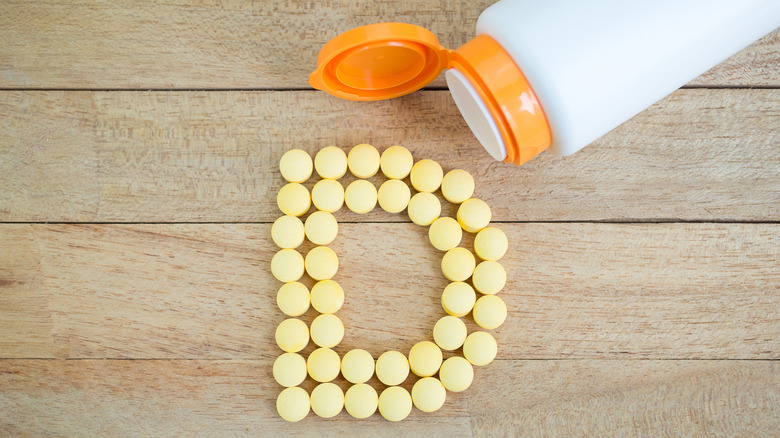Can You Overdose On Vitamin D?
You are probably aware that our bodies convert sunshine into vitamin D. In fact, spending just 20 minutes in the sun with 40% of skin exposed is enough to prevent a deficiency. Vitamin D offers many benefits including immune health and mood regulation, and it helps fight against heart diseases, high blood pressure, stroke, and heart failure (via Healthline). A deficiency of the vitamin can lead to high blood pressure, diabetes, infections, immune system disorders, and multiple sclerosis, according to the Cleveland Clinic.
Despite being able to derive vitamin D from sunshine, about 1 billion people worldwide have a deficiency, and 50% of the population has vitamin D insufficiency, per StatPearls. You may be taking vitamin D3 supplements to ensure you are getting enough, but there is such a thing as overdosing on it. In fact, doctors recently issued a warning about taking too much vitamin D in a report published in BMJ Case Reports.
Too much vitamin D can result in hypervitaminosis D
The report highlighted how doctors treated one man after he experienced several symptoms, including vomiting, nausea, diarrhea, dry mouth, abdominal pain, tinnitus, leg cramps, and weight loss for almost three months. He began to experience symptoms after starting to consume high doses of vitamin D (around 150,000 IU), along with other supplements. After performing a series of tests, doctors discovered that he had high levels of calcium. His levels of vitamin D were also seven times higher than they should have been, resulting in a variety of symptoms, including acute kidney injury.
Overdosing on vitamin D can lead to hypervitaminosis D, and this condition is on the rise, although experts state that it is rare. Symptoms of the condition include fatigue, dehydration, vomiting, constipation, high blood pressure, abnormal heart rhythm, and weight loss. Long-term issues include kidney failure and hardening of the arteries, per MedicalNewsToday.
The recommended daily intake of vitamin D is 600 to 800 IU daily with an upper limit of 4,000 IU. You should always consult with your doctor before taking high doses of any vitamin (via Cleveland Clinic).


